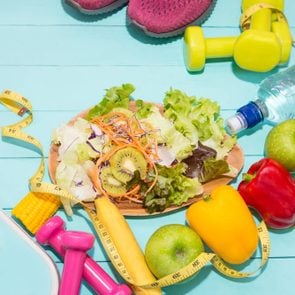What Is the 75 Hard Challenge—and Is it Healthy?
Updated: May 12, 2021
The fitness challenge 75 Hard is taking over social media, but is it safe to do? Experts share their thoughts on the 75 Hard challenge rules and whether they would recommend trying the program.
What to know about a popular TikTok challenge
A little extra motivation to eat right and exercise goes a long way.
This gentle kick in the butt might come in the form of fitness tracker notifications that remind you to stand up from your desk or a healthy meal delivery service box that makes cooking easier.
Motivation may even come from sharing your journey on social media.
That’s how many people discovered the 75 Hard challenge, a plan created by motivational speaker, podcaster, author, and supplement company owner Andy Frisella. It involves following seven specific 75 Hard challenge rules.
We spoke with experts about the good, the bad, and the downright ugly parts of this program, which is popular on TikTok.
Here’s what you need to know about 75 Hard before you give it a try.
What is the 75 Hard challenge?
Frisella first introduced the concept of the challenge on his podcast, “Real AF,” in March 2019. Since then, he’s created a book, website, and app dedicated to the program.
According to the 75 Hard website, the program isn’t a regular fitness program; it’s a “mental toughness program.”
The challenge calls for following certain rules for 75 days and recording your progress. Frisella leaves little room for flexibility, noting on the sign-up page that there are “zero substitutions.”
Here’s the catch: Frisella came up with the program based on his own personal experience, and he’s not a doctor, dietitian, certified trainer, therapist, or even in the field of health care.
The program itself doesn’t reference any published scientific literature or other medical or health experts.
What are the 75 Hard challenge rules?
- Follow a diet
- Drink a gallon of water per day
- Complete two 45-minute workouts each day (one must take place outdoors)
- Avoid alcohol and do not eat any cheat meals
- Take progress pictures every day
- Read 10 pages of a nonfiction book daily (audiobooks do not count)
- Perform random acts of kindness
Is 75 Hard dangerous?
However many benefits you may (or may not) get from this program, they don’t outweigh the possible risks. And those are numerous.
TikTok may love the 75 Hard challenge, but experts point to several good reasons you should think twice.
It may lead to overtraining or injury.
Exercising every day for 75 days straight is a recipe for injury or overtraining.
According to Jim White, a registered dietitian, personal trainer certified by the American College of Sports Medicine, and owner of Jim White Fitness & Nutrition Studios, athletes or people training for marathons do more than an hour and a half of exercise a day.
But for the average person, an hour and a half are well beyond the recommendation.
“And there are no recovery days, so it can lead to overtraining, especially if some of those workouts aren’t just a walk outside,” White says. “It puts fitness as one of the top priorities in life.”
It’s not a program White recommends for everybody, and he’s especially wary of it for people who are new to exercise or those with injuries. “I think a program like this in real life would need to be modified,” he says.
He recommends modifying the program by walking or doing yoga for required workout sessions. “I wouldn’t recommend doing seven days of high-intensity [exercise] because you will definitely get hurt or overtrain,” he says.
(Here are the times when you shouldn’t work out.)
It’s not sustainable.
Kelly Vargo, a certified strength and conditioning specialist in Washington, D.C., and an instructor in the Department of Exercise and Nutrition Sciences at George Washington University, says there are many risks of a program like the 75 Hard challenge.
One is becoming victim to an all-or-nothing mindset and not recovering from a setback or injury.
“In addition, after the 75 days are over, then what?” she asks. “Just start counting 75 days over again? Go back to eating how you used to?”
There doesn’t appear to be any information about sustaining or transferring some potential positive habits once the 75 days end.
“Don’t fall for the one-size-fits-all, cookie-cutter plan,” Vargo says. “Sure, it may work for X number of days, but then what will you do when that time frame is up?”
White adds that if people don’t have the foundation of a healthy lifestyle to fall back on, they usually can’t maintain the results they get from 75 Hard.
“I’ve seen that happen … just in my experience. They didn’t have a program set up,” White says. “Realistically, you just can’t do a program like this for the rest of your life with seven days a week.”
Frisella sells at least three other 30-day programs, all intended for use after 75 Hard. But they follow many of the same rules with a few additions, like taking a cold shower and doing meditation.
These other weight-loss challenges are a bit more sustainable.
The advice to “follow a diet” is vague.
There aren’t any specific dietary benefits to this program, according to registered dietitian Malina Malkani.
If you’re embarking on this program, you might be wondering which diet will yield the sort of results Frisella promises or past participants show off on social media. Are they restricting calories? Eating vegan? Joining Jenny Craig?
“Frisella doesn’t make any dietary recommendations except to ‘go on any diet,'” Malkani says.
The lack of guidance may do more than confuse. It may lead to harm.
According to Malkani, most of the dietary risks associated with the 75 Hard challenge depend on which diet the individual taking the challenge chooses to follow.
A too-strict diet, especially in combination with such an intense workout plan, could be harmful.
Plus, Malkani points out, diets just don’t work.
“We have overwhelming evidence at this point that diets don’t work in the long term, yet so many people are still determined to try the latest fad diet in the hopes that it will finally be the answer to weight loss,” she says.
Adopting a gentler approach to wellness and healthy lifestyle habits is more likely to help you achieve long-term weight loss than a diet will, says Malkani. Some habits to implement include eating more vegetables and fruits and limiting heavily processed foods.
White points out that the lack of detail regarding the diet can be a negative. “Some people need actual recommendations, so I always recommend contacting a registered dietitian to put people on a program,” he says.
Still, he says the vague diet requirement is there for a reason: so people have some leeway to pick a diet that works for them.
It may increase stress.
Although it’s a nice thought, Vargo says that one random act of kindness a day doesn’t replace the lost time and energy spent worrying about measuring your food or getting in your second workout.
Trying to stick to such a strict program may end up stressing you out. And that can make the whole weight-loss aspect of the plan backfire.
Research in The Journal of Neuroscience demonstrated that mice whose calories were restricted showed a greater stress response and higher levels of the stress hormone cortisol. The study’s authors say that, in humans, this could lead to behaviors that lead to weight gain, like binge eating.
“Therefore, when you are on such a strict program, a [high] stress and cortisol ride, results get harder to attain,” Vargo says.

It may affect other aspects of mental health.
“The least-mentioned part of fitness, in my opinion, is mental health,” says Morgan Rees, a Los Angeles-based personal trainer certified by the American Council on Exercise.
“People who self-sabotage or have issues with not completing an activity to its fullest could immensely struggle with a challenge like this,” Rees says. “There are a lot of requirements on a daily basis that could be easy to miss.”
What happens if you’re sick, if you didn’t sleep well the night before, or if you’re too busy to get your second workout in? These things could affect someone in a negative way and make them feel unaccomplished or inadequate, she notes.
“I’ve seen a lot of people go through a lot of health crises mentally and emotionally with a challenge like this,” says Rees, whose friend attempted the challenge this past summer. “It’s hard for me to defend it when I’ve seen it do so much damage.”
It may trigger disordered eating habits.
Super-strict health challenges like 75 Hard often trigger people with a history of eating disorders or disordered eating patterns.
“A small subset of people do enjoy and embrace extreme challenges like the 75 Hard challenge, but for anyone with any history of disordered eating or a disordered relationship with exercise, this challenge would likely be quite triggering and possibly dangerous,” Malkani says.
Vargo says there’s a high potential for, “engaging in binge eating, engaging in binge drinking, becoming obsessed with workouts and food, becoming self-absorbed, having a decreased social interaction with family, friends, and loved ones, and overall being miserable.”
Doesn’t exactly sound like the sort of program that’ll make you happier and healthier, does it?
Malkani also points out that although the marketing says this is a “mental toughness program,” one of the 75 Hard challenge rules is taking daily photos of yourself, which “emphasizes outer appearance as opposed to health and inner strength and growth,” she says.
Water intoxication is possible.
Malkani says instructing every challenge participant to drink a gallon of water daily is problematic.
“Fluid needs vary among individuals and are dependent on a number of factors, including level of activity, weather, altitude, body size, gender, and medical conditions,” she says.
Caroline Apovian, MD, codirector of the Center for Weight Management and Wellness at Brigham and Women’s Hospital and a Harvard Medical School faculty member agrees. She says the most outrageous of the 75 hard challenge rules is drinking a gallon of water a day. “I am not sure most people need to drink that much water,” she says.
Although hydration is important, if you drink too much water you could actually harm your health.
The worst-case scenario is water toxicity, which happens because drinking too much water upsets electrolyte balances. It could cause confusion, nausea, and vomiting.
Exercising outside every day is not always a safe option.
It may seem obvious, but another potential risk is working out outside every day.
“What if you live in a very cold climate?” Rees asks. “It can be very dangerous to go outside and work out if it’s too cold. It could also be too hot.”
If an outdoor workout would be too cold, too hot, or too dangerous, skip it. While outdoor workouts are nice, they’re not a necessity for health.
Are there any benefits of 75 Hard?
Along with the myriad of risks, there are some health benefits that come from the program.
It may introduce good habits.
Dr. Apovian sees some positives in this program.
“I think any type of program … that gets someone to drink more water and exercise more, read more and be kind to others, and not drink alcohol, is a healthy program in general,” she says, though she’s quick to point out that Frisella doesn’t seem to have any qualifications whatsoever to be telling people what to do. And she notes that this program isn’t based on scientific evidence.
Vargo agrees that there are some theoretical benefits. She says a program like this may help you create a routine, establish a habit, and potentially expose you to new types of workouts.
It can keep things planned and organized.
White says he likes the organization of the program.
The check-off system in the 75 Hard app is motivational and helps people stick to the 75 Hard challenge rules, White says. He adds that the program provides a good structure and focus.
It may help you lose weight.
According to White, the program can work for weight loss because it focuses on both diet and exercise.
In fact, White put 12 people on the program who together lost a total of over 250 pounds. And that doesn’t even include the muscle mass they gained. “It was a total transformation,” White says.
That’s why he likes the progress picture aspect of the challenge. “The point of this is not for the vanity aspect, it’s to see results,” he says. “And what motivates a lot of people are results.”
It cuts out alcohol.
Cutting out alcohol may help people cut calories, which will contribute to weight loss. (Besides, cutting back on booze is good for your overall health.)
“If someone really is drinking a lot and they can’t get it under control, doing [75 Hard] definitely decreases your want for it,” White says. “And everyone I’ve talked to who has successfully done it wasn’t really interested in alcohol [afterward].”
It’s competitive.
White tried the program this year and is currently doing another round of the challenge. He really enjoyed the challenge aspect of the program, especially because other challenges, competitions, and races were canceled due to the pandemic.
“I think it appeals to a certain person, and it’s definitely hard; there’s no doubt about it,” White says. “Everyone who did it in our group was not new to the exercise game. We had iron men, people who did bodybuilding, and people who are just athletes.”
So, do experts recommend trying 75 Hard?
Malkani doesn’t recommend extreme challenges or diets in general. In order for dietary and lifestyle changes to improve health in the long term, they need to be sustainable.
Dr. Apovian agrees. The lack of sustainability is one reason she wouldn’t suggest a patient try the challenge. But she wouldn’t necessarily recommend this program for health benefits either.
Vargo says she’s essentially done the 75 Hard program in the form of figure competition preparation, a physique exhibition similar to bodybuilding.
“I was miserable preparing for the ‘end of the 75 days,'” Vargo says. She gained back 20 pounds within a month and felt like the only way to get back to “looking ripped” was to spend more than two hours in the gym a day.
She adds that there are many ways to lose weight fast, as with this program. But she personally prefers mindfulness and moderation when it comes to diet and exercise, not feeling stuck with a specific set of rules.
“I like to look at anything we do as a form of investing,” Vargo says. “So if I were to step back and do a cost-benefit analysis of the program, I would conclude that the cost and the risks outweigh the benefits.”
White likes aspects of the program, but he doesn’t think it’s a good fit for everyone or a program to do indefinitely.
“I’m all about doing something for a short period of time just to get a jump start, as long as [there’s] something to fall into,” White says. “What’s the point of doing this if you’re just gonna end up going off after? It’s not worth it, and it could be dangerous to your health.”
Rees would never try this challenge herself, although she says it could be a good—albeit very rough—outline. “People can tweak certain aspects of it and add other things in,” she says.
Keep all of this in mind if you decide to try the program. And if you still decide to give it a try, talk to your doctor first to make sure you follow it as safely as possible.
Next, check out the signs you’re working out too much.

















